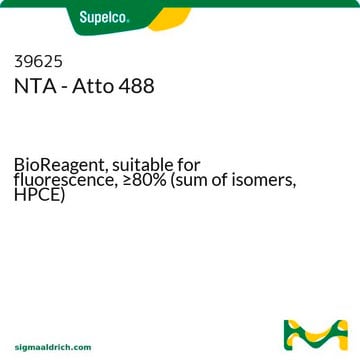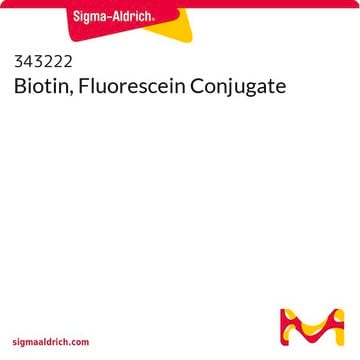43208
Atto 590-Biotin
BioReagent, suitable for fluorescence, ≥90.0% (HPLC)
Sinónimos:
Biotin-Atto 590
About This Item
Productos recomendados
product line
BioReagent
assay
≥90.0% (HPLC)
manufacturer/tradename
ATTO-TEC GmbH
λ
in ethanol (with 0.1% trifluoroacetic acid)
UV absorption
λ: 593-599 nm Amax
suitability
suitable for fluorescence
storage temp.
−20°C
Application
Legal Information
Storage Class
11 - Combustible Solids
wgk_germany
WGK 3
flash_point_f
Not applicable
flash_point_c
Not applicable
ppe
Eyeshields, Gloves, type N95 (US)
Certificados de análisis (COA)
Busque Certificados de análisis (COA) introduciendo el número de lote del producto. Los números de lote se encuentran en la etiqueta del producto después de las palabras «Lot» o «Batch»
¿Ya tiene este producto?
Encuentre la documentación para los productos que ha comprado recientemente en la Biblioteca de documentos.
Los clientes también vieron
Artículos
Atto dyes are a series of fluorescent dyes that meet the critical needs of modern fluorescent technologies.
Atto dyes are a series of fluorescent dyes that meet the critical needs of modern fluorescent technologies.
Atto dyes are a series of fluorescent dyes that meet the critical needs of modern fluorescent technologies.
Atto dyes are a series of fluorescent dyes that meet the critical needs of modern fluorescent technologies.
Nuestro equipo de científicos tiene experiencia en todas las áreas de investigación: Ciencias de la vida, Ciencia de los materiales, Síntesis química, Cromatografía, Analítica y muchas otras.
Póngase en contacto con el Servicio técnico








